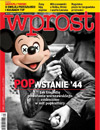
The tragedy of the Warsaw uprising in 1944 has been turned “into a pop-cultural myth”, writes Wprost about the rebellion that started on August 1, 1944.
Comics, books, songs, and films are being made in which Polish insurgents resemble “superheroes rather than a group of desperates”, notes the weekly. “They were young, pretty, in love, and they died prematurely,” which makes them as attractive for popular culture as members of the “27 Club” of musicians who died young, including Jimi Hendrix, Kurt Cobain and Amy Winehouse.
However, notes Wprost, the idealised image of the Warsaw uprising, in which some 216,000 Poles, mostly civilians, and 8,000 German soldiers died, should not blur the fact that –
It was a massacre that did not achieve its goals, just like Kościuszko in 1794, the November 1830, and the January 1863 Uprisings. And just like them, it continues the tradition of the romantic, sacred hero detached from reality. The hero who doesn’t know fear and sex.
Do you like our work?
Help multilingual European journalism to thrive, without ads or paywalls. Your one-off or regular support will keep our newsroom independent. Thank you!















